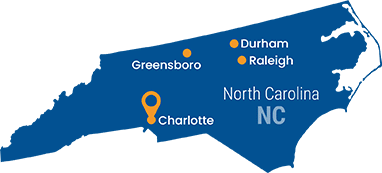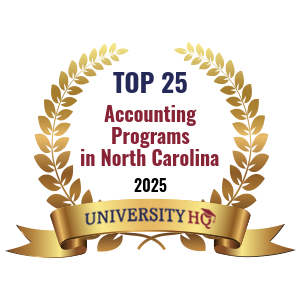What is Accounting?
North Carolina is an excellent location to become a CPA. While the national 10 year growth projection for the profession is 10 percent, in North Carolina it's a robust 16.1 percent, making becoming a CPA a very good for future CPAs.
Like other states, in North Carolina you'll be required to pass the national Certified Public Accountant CPA Exam prior to becoming a CPA, which is considered to be one of the toughest professional exams in the country. You must meet specific educational requirements before becoming eligible to sit for the CPA Exam. In North Carolina you must have 150 credit hours of accounting. Unlike other states, you may sit for the CPA Exam as soon as you earn your BS degree in an accounting subject, (but may not become licensed until you fulfill the mandatory 150 credit hour requirement) as long as you've passed all of the required accounting courses. This is an advantage as you can conceivably earn your degree, take the CPA Exam, and begin fulfilling the experience requirement while completing the required college courses.

Featured Online Programs
Best Schools for Accounting in North Carolina
University of North Carolina at Chapel Hill
Score: 92.74
- Undergraduate Tuition
- In-State: $8,989
- Out-of-State:$39,330
- Net Price: $11,140
- Acceptance Rate: 19%
- Retention Rate: 97%
- Graduation Rate: 92%
- Total Enrollment: 32,234
- Undergrad Students: 20,681
- Graduate Students: 11,553
- Grads Salary: $77,000
- Student-to-faculty: 15:1
North Carolina State University at Raleigh
Score: 90.22
- Undergraduate Tuition
- In-State: $8,895
- Out-of-State:$31,767
- Net Price: $14,860
- Acceptance Rate: 40%
- Retention Rate: 93%
- Graduation Rate: 85%
- Total Enrollment: 37,323
- Undergrad Students: 27,323
- Graduate Students: 10,000
- Grads Salary: $82,000
- Student-to-faculty: 15:1
Wake Forest University
Score: 87.88
- Undergraduate Tuition
- In-State: $64,758
- Out-of-State:$64,758
- Net Price: $27,790
- Acceptance Rate: 22%
- Retention Rate: 95%
- Graduation Rate: 91%
- Total Enrollment: 9,121
- Undergrad Students: 5,471
- Graduate Students: 3,650
- Grads Salary: $79,000
- Student-to-faculty: 9:1
North Carolina A&T State University
Score: 79.84
- Undergraduate Tuition
- In-State: $6,748
- Out-of-State:$20,408
- Net Price: $10,258
- Acceptance Rate: 46%
- Retention Rate: 80%
- Graduation Rate: 55%
- Total Enrollment: 13,885
- Undergrad Students: 12,216
- Graduate Students: 1,669
- Grads Salary: $79,000
- Student-to-faculty: 20:1
University of North Carolina at Charlotte
Score: 77.94
- Undergraduate Tuition
- In-State: $7,214
- Out-of-State:$21,876
- Net Price: $13,768
- Acceptance Rate: 80%
- Retention Rate: 85%
- Graduation Rate: 68%
- Total Enrollment: 30,298
- Undergrad Students: 23,981
- Graduate Students: 6,317
- Grads Salary: $74,000
- Student-to-faculty: 21:1
Appalachian State University
Score: 74.24
- Undergraduate Tuition
- In-State: $7,541
- Out-of-State:$24,537
- Net Price: $14,712
- Acceptance Rate: 89%
- Retention Rate: 85%
- Graduation Rate: 73%
- Total Enrollment: 21,253
- Undergrad Students: 19,405
- Graduate Students: 1,848
- Grads Salary: $64,000
- Student-to-faculty: 16:1
East Carolina University
Score: 74.24
- Undergraduate Tuition
- In-State: $7,361
- Out-of-State:$23,638
- Net Price: $14,470
- Acceptance Rate: 90%
- Retention Rate: 82%
- Graduation Rate: 62%
- Total Enrollment: 26,785
- Undergrad Students: 21,328
- Graduate Students: 5,457
- Grads Salary: $71,000
- Student-to-faculty: 17:1
Winston-Salem State University
Score: 73.44
- Undergraduate Tuition
- In-State: $6,735
- Out-of-State:$17,391
- Net Price: $12,948
- Acceptance Rate: 69%
- Retention Rate: 75%
- Graduation Rate: 49%
- Total Enrollment: 4,776
- Undergrad Students: 4,260
- Graduate Students: 516
- Grads Salary: $74,000
- Student-to-faculty: 16:1
Meredith College
Score: 72.18
- Undergraduate Tuition
- In-State: $43,936
- Out-of-State:$43,936
- Net Price: $23,405
- Acceptance Rate: 75%
- Retention Rate: 81%
- Graduation Rate: 65%
- Total Enrollment: 1,576
- Undergrad Students: 1,309
- Graduate Students: 267
- Grads Salary: $68,000
- Student-to-faculty: 10:1
Elon University
Score: 72.15
- Undergraduate Tuition
- In-State: $44,536
- Out-of-State:$44,536
- Net Price: $41,849
- Acceptance Rate: 67%
- Retention Rate: 90%
- Graduation Rate: 83%
- Total Enrollment: 7,207
- Undergrad Students: 6,402
- Graduate Students: 805
- Grads Salary: $69,000
- Student-to-faculty: 11:1
Western Carolina University
Score: 71.49
- Undergraduate Tuition
- In-State: $4,532
- Out-of-State:$8,532
- Net Price: $12,252
- Acceptance Rate: 87%
- Retention Rate: 76%
- Graduation Rate: 59%
- Total Enrollment: 11,628
- Undergrad Students: 10,009
- Graduate Students: 1,619
- Grads Salary: $66,000
- Student-to-faculty: 16:1
Queens University of Charlotte
Score: 71.14
- Undergraduate Tuition
- In-State: $43,285
- Out-of-State:$43,285
- Net Price: $27,178
- Acceptance Rate: 68%
- Retention Rate: 76%
- Graduation Rate: 66%
- Total Enrollment: 1,846
- Undergrad Students: 1,373
- Graduate Students: 473
- Grads Salary: $68,000
- Student-to-faculty: 9:1
University of North Carolina at Greensboro
Score: 71.01
- Undergraduate Tuition
- In-State: $7,593
- Out-of-State:$23,339
- Net Price: $10,592
- Acceptance Rate: 90%
- Retention Rate: 76%
- Graduation Rate: 58%
- Total Enrollment: 17,743
- Undergrad Students: 14,156
- Graduate Students: 3,587
- Grads Salary: $65,000
- Student-to-faculty: 17:1
Elizabeth City State University
Score: 70.49
- Undergraduate Tuition
- In-State: $3,412
- Out-of-State:$7,412
- Net Price: $7,363
- Acceptance Rate: 70%
- Retention Rate: 74%
- Graduation Rate: 48%
- Total Enrollment: 2,165
- Undergrad Students: 2,048
- Graduate Students: 117
- Grads Salary: $65,000
- Student-to-faculty: 17:1
Guilford College
Score: 69.84
- Undergraduate Tuition
- In-State: $41,140
- Out-of-State:$41,140
- Net Price: $22,620
- Acceptance Rate: 84%
- Retention Rate: 66%
- Graduation Rate: 48%
- Total Enrollment: 1,208
- Undergrad Students: 1,160
- Graduate Students: 48
- Grads Salary: $77,000
- Student-to-faculty: 12:1
Gardner-Webb University
Score: 68.04
- Undergraduate Tuition
- In-State: $33,450
- Out-of-State:$33,450
- Net Price: $24,035
- Acceptance Rate: 87%
- Retention Rate: 69%
- Graduation Rate: 62%
- Total Enrollment: 3,125
- Undergrad Students: 1,840
- Graduate Students: 1,285
- Grads Salary: $66,000
- Student-to-faculty: 11:1
Campbell University
Score: 67.11
- Undergraduate Tuition
- In-State: $40,410
- Out-of-State:$40,410
- Net Price: $24,517
- Acceptance Rate: 94%
- Retention Rate: 75%
- Graduation Rate: 56%
- Total Enrollment: 5,115
- Undergrad Students: 2,813
- Graduate Students: 2,302
- Grads Salary: $68,000
- Student-to-faculty: 13:1
Greensboro College
Score: 66.99
- Undergraduate Tuition
- In-State: $20,400
- Out-of-State:$20,400
- Net Price: $19,783
- Acceptance Rate: 92%
- Retention Rate: 63%
- Graduation Rate: 41%
- Total Enrollment: 898
- Undergrad Students: 809
- Graduate Students: 89
- Grads Salary: $74,000
- Student-to-faculty: 10:1
University of Mount Olive
Score: 66.91
- Undergraduate Tuition
- In-State: $25,950
- Out-of-State:$25,950
- Net Price: $17,893
- Acceptance Rate: 78%
- Retention Rate: 77%
- Graduation Rate: 47%
- Total Enrollment: 2,128
- Undergrad Students: 1,937
- Graduate Students: 191
- Grads Salary: $67,000
- Student-to-faculty: 19:1
Catawba College
Score: 66.75
- Undergraduate Tuition
- In-State: $33,400
- Out-of-State:$33,400
- Net Price: $18,319
- Acceptance Rate: 78%
- Retention Rate: 73%
- Graduation Rate: 52%
- Total Enrollment: 1,241
- Undergrad Students: 1,153
- Graduate Students: 88
- Grads Salary: $63,000
- Student-to-faculty: 12:1
Pfeiffer University
Score: 66.7
- Undergraduate Tuition
- In-State: $33,930
- Out-of-State:$33,930
- Net Price: $21,402
- Acceptance Rate: 95%
- Retention Rate: 68%
- Graduation Rate: 43%
- Total Enrollment: 954
- Undergrad Students: 654
- Graduate Students: 300
- Grads Salary: $74,000
- Student-to-faculty: 14:1
Wingate University
Score: 66.68
- Undergraduate Tuition
- In-State: $40,196
- Out-of-State:$40,196
- Net Price: $21,464
- Acceptance Rate: 85%
- Retention Rate: 67%
- Graduation Rate: 47%
- Total Enrollment: 3,322
- Undergrad Students: 2,464
- Graduate Students: 858
- Grads Salary: $71,000
- Student-to-faculty: 15:1
Fayetteville State University
Score: 66.49
- Undergraduate Tuition
- In-State: $3,969
- Out-of-State:$7,969
- Net Price: $7,298
- Acceptance Rate: 80%
- Retention Rate: 78%
- Graduation Rate: 35%
- Total Enrollment: 6,847
- Undergrad Students: 5,845
- Graduate Students: 1,002
- Grads Salary: $65,000
- Student-to-faculty: 19:1
University of North Carolina at Asheville
Score: 65.78
- Undergraduate Tuition
- In-State: $7,461
- Out-of-State:$24,809
- Net Price: $14,175
- Acceptance Rate: 94%
- Retention Rate: 73%
- Graduation Rate: 55%
- Total Enrollment: 2,925
- Undergrad Students: 2,907
- Graduate Students: 18
- Grads Salary: $58,000
- Student-to-faculty: 11:1
North Carolina Central University
Score: 65.13
- Undergraduate Tuition
- In-State: $6,542
- Out-of-State:$19,578
- Net Price: $13,884
- Acceptance Rate: 90%
- Retention Rate: 75%
- Graduation Rate: 46%
- Total Enrollment: 7,965
- Undergrad Students: 5,973
- Graduate Students: 1,992
- Grads Salary: $62,000
- Student-to-faculty: 16:1
Online Accounting Education in North Carolina
North Carolina CPA licensure is overseen by the NC State Board of Certified Public Accountant Examiners (NCCPA) and accepts degrees from the following accreditation associations, so your first step in becoming a CPA should be to make sure your school is accredited:
- Council on Occupational Education (formerly Southern Association of Colleges and Schools, Commission on Occupational Education Institutions)
- Middle States Association of Colleges and Schools, Commission on Higher Education
- New England Association of Schools and Colleges, Commission on Institutions of Higher Education
- New England Association of Schools and Colleges, Commission on Technical & Career Institutions
- North Central Association of Colleges and Schools, Higher Learning Commission
- Northwest Association of Schools and Colleges, Commission of Colleges & Universities
- Southern Association of Colleges and Schools, Commission on Colleges
- Western Association of Schools and Colleges, Accrediting Commission for Community and Junior Colleges
- Western Association of Schools and Colleges, Accrediting Commission for Senior Colleges and Universities
Your concentration in accounting must be a minimum of 30 credit hours of accounting courses at the undergraduate level with the following stipulations:
No more than six credit hours of accounting principles and no more than three credit hours of business law
Or
A minimum of 20 graduate accounting courses exclusive to graduate students
Or
A combination of undergraduate and graduate courses can be equivalent to one of the above. If you're combining undergraduate and graduate courses one semester hour of accounting graduate study will be considered the equivalent of one and one-half undergraduate semester hours of the same.
The following are examples of required accounting core subjects:
- Auditing
- Business law
- Cost accounting
- Fund accounting
- Managerial accounting
- Taxation
In addition CPA candidates need to complete the North Carolina Accountancy Statutes and Rules course.
Of the 150 credit hours required, 24 credit hours must include a three semester hours from eight of the following subjects:
- Communications
- Computer technology
- Economics
- Ethics
- Finance
- Humanities/social science
- International environment
- Law
- Management
- Statistics
If you have earned a Master's degree in accounting, economics, tax law, business administration, finance, or law you have probably completed this requirement.
Other sample subjects you may use to complete the 150 hour requirement are:
- Business finance
- Business management
- Computer science
- Economics
- Writing skills
- Accounting internships
Unlike most states, North Carolina does not have any specific business course requirements to qualify to sit for the CPA Exam. That being said, the CPA Exam covers many business topics so CPA candidates should plan on including a wide range of accounting related business subjects in the 150 credit hour requirement.
Online Associates (AS)

At this degree level, you will learn things like the accounting cycle, spreadsheets, financial components and documents, accounting systems, and business communication. When you choose to earn an associate degree in accounting, it’s important to understand that the degree will give you access only to entry-level positions in smaller companies. For greater access to positions and better salaries, you’ll need to earn at least a bachelor’s.
Online Bachelors (BS, BAcc or B.Acy)

With a bachelor's degree you are eligible to become a CPA. During a bachelor's degree program, you will explore financial information systems, accounting practices, taxation, and auditing, as well as financial reports and more complex documentation. This degree will provide access to entry-level positions in all types of accounting firms and company’s accounting departments, along with the chance for promotion. You may need to earn certification to continue to improve in your career, but you won’t necessarily need to earn any other degree.
Online Masters (MS, MAcc or M.Acy)

The master's program will explore more in-depth the accounting field including topics like data modeling, managerial finance, and corporate taxation. You can also specialize in something like forensic accounting or managerial accounting if you have a specific future career trajectory in mind. With this degree you will have access to any position, all the way to the C-suites. You’ll also be ready become a Certified Public Accountant CPA license or any other certification you need throughout your career.
Online Doctorate (PhD)
This is the highest accounting degree you can earn. You can use this degree to become a CPA as well. You will learn things like modern economic theory, as well as other financial theories and more in this expert level curriculum. Most companies do not require their accountants to earn this level of degree, but you might choose to if you wish to enter an academic setting.
Online Degree in Accounting
Many North Carolina colleges offer online accounting degree programs from associate level through advanced degrees, including North Carolina State University and Franklin University of NC. There are new online courses and programs being created all the time, so check with your school of choice to see if there’s an online program available for you.
Get more resources and scholarship helpNorth Carolina CPA Exam Requirements
In North Carolina CPA candidates will apply for the CPA Exam directly through the State Board of Accountancy. The CPA Exam itself is overseen by the National Association of State Boards of Accountancy (NASBA) and is given by Prometrics Testing. After you apply for the CPA Exam, you are on your way to becoming a CPA.
The following fees will need to be paid when CPA candidates register and apply to sit for the exam.
Note that there is one administration fee as well as a separate fee for each exam section:
| Application fee | $230.00 |
|---|---|
| Auditing & Attestation (AUDIT) | $208.40 |
| Financial Accounting & Reporting (FAR) | $208.40 |
| Regulation (REG) | $208.40 |
| Business Environments & Concepts (BEC) | $208.40 |
CPA candidates may apply to schedule one test or all four at the same time; scheduling will be done after the application is approved.
Along with the fees CPA candidates need to fill out the CPA Exam application form, which can be downloaded and printed.
Your school transcripts must be sent directly from the school and you'll need to provide the following with your application:
- Passport-type photo
- Preferred method of contact
- Three moral character references (non-family)
The CPA Exam application requires disclosure of any court records, current or previous legal charges, and probation status if applicable. The application is an affidavit and the board does conduct a background check so be honest with your information.
If CPA candidates need a special accommodation to sit for the test there are specific forms they may download and complete; this documentation should be included with the initial application as well.
Once you submit your application it will take from 15 to 20 business days for the board to receive your transcripts and process your application. You will receive a Notice to Sit (NTS) in the mail. Keep your NTS in a safe place as you will need to present it for entry to the exam test center. Make sure to verify that your name is correct on the NTS and exactly matches your legal photo ID.
- Sit for the NC CPA exam
Once CPA candidates receive the NTS, they should contact Prometrics to schedule the CPA Exam. You will be allowed four hours to complete each CPA Exam section; they may be taken in any order. You must score a minimum of 75 percent on each exam section to pass the CPA Exam and may retake any section you do not pass. The only requirement to pass the CPA exam is that you pass all four sections within an 18 month period.
Prometrics has test centers in the following North Carolina cities:
- Asheville
- Charlotte
- Greensboro
- Greenville
- Raleigh
- Wilmington
There are additional testing centers in South Carolina and Virginia and CPA candidates may choose any location that is convenient to them.
CPA candidates should plan on arriving an hour early for the CPA Exam. CPA candidates must have a NTS and valid photo ID in order to gain entry, and these are the only items that will be allowed into the testing room. Prometrics will provide a secure locker for CPA candidates other personal items.
CPA candidates receive CPA Exam scores via mail during the tabulation month after they take the test: March, June, September, or December. Although the scores are sent by mail they will be available online first. Both NASBA and the NC Board also post score release information on their Twitter and Facebook pages. Now you are on your way to becoming a CPA.
Find Colleges Offering Accounting Programs Online
Continuing Professional Education (CPE) Requirements
In North Carolina you'll need to renew your Certified Public Accountant CPA license every year before July 1st and there is a $60 renewal fee. During the year preceding renewal you are required to complete 40 hours of continuing professional education (CPE). The reporting period for CPE is the calendar year from January 1st to December 31st. Of the 40 hours a minimum two hours must be on regulatory or behavioral professional ethics and conduct. This ethics course may be in a self-study format or in a group-study format.
If you complete more than 40 hours of CPE in a calendar year you may carry over up to 20 hours to the following year excepting the annual required ethics exam and course hours. To receive credit for a CPE course you must attend or complete the course and receive a certificate of completion, and the course must increase the professional competency of the CPA.
Credit for a CPE course must be in one of the seven fields of study recognized by the Board:
- Accounting and Auditing
- Consulting Services
- Ethics
- Management
- Business Law
- Personal Development
- Special Knowledge and Applications
- Tax
CPE must take the form of a formal course of learning.
The following type of courses may qualify as acceptable continuing education:
- Courses taken at accredited colleges
- formal correspondence courses
- Formal education programs conducted within an association of accounting firms
- Technical sessions at meetings of national and state accounting organizations
- Professional development programs of national and state accounting organizations
- Teaching a CPE course for CPAs
- Authoring a publication
The following criteria also apply to your annual CPE:
- No self study course may contain less than 25 minutes of course material.
- One college semester hour equals 15 CPE hours; One quarter hour equals 10 CPE hours.
- No CPE credit is given for an audited course.
- Instruction: Credit is equal to presentation plus preparation. No credit for repeat instruction during the same year.
- CPE credit for instructing a graduate level college course shall be given based on the number of credit hours the college gives a student for successfully completing the course.
- Instructor credits are limited to 50 percent of total CPE hours.
- Credit will not be given for instructing an undergraduate level course.
- Authorship credits are limited to 25 percent of total hours.
Become a Certified Public Accountant in North Carolina
Before you can become a CPA you'll also need meet the on the job experience requirements.
In North Carolina there's a standard requirement of one year of experience for becoming a CPA but there are six options accepted:
- One year in public accounting practice under the supervision of a licensed CPA
- One year private practice under the supervision of a licensed CPA
- Four years experience of full-time teaching of accounting at an accredited college or university (with specific conditions)
- Four years of experience in self-employed accounting
- Four years of accounting experience requirements without licensed CPA supervision
- An equivalent combination of the above options
If you choose the teaching option the following stipulations are in effect:
- Courses must be in the accounting field
- Accounting Principles can only be two of the four years
-
A minimum two years must be in advanced accounting courses with a minimum nine semester hours in at least two of the following:
- Auditing
- Advanced managerial accounting
- Income tax
- Intermediate financial accounting
A year of experience is considered the equal of 52 weeks of full-time employment of a minimum 30 hours per week. Once you've met the experience you must download the North Carolina Experience Affidavit, filled out by both you and your employer. This is required for becoming a CPA. There is a separate form for teaching experience requirements as well as part-time work experience requirements.
Getting Your CPA License in North Carolina
Once your experience requirements are met you will be eligible to become a Certified Public Accountant.
You'll need to submit the following to the NC State Board of CPA Examiners:
- Certification application
- Experience Affidavit
- Recent two-by-two inch passport-type photo
- Copy of the certificate of completion of the North Carolina Accountancy Statutes and Rules course
- Check or money order for $100.00 certification fee
- Three forms from licensed CPAs that attest to your good moral character
Once you pass the CPA Exam and the board processes your application, you'll receive your CPA certificate in the mail and will officially be a licensed North Carolina Certified Public Accountant.
Potential Careers for Accounting Graduates
When it comes to mean annual wage, North Carolina’s numbers are significantly lower and higher. Employment numbers also range wildly, with the northeast coastal area employing the lowest number and Greensboro-High Point employing the highest number of accountants and auditors. There are around 43,100 accountants employed in North Carolina, which represents about 8.99 accountants per 1,000 people employed in the state with an annual mean salary of $90,870.
- Accountant
- Certified Professional Accountant (CPA)
- Accounts Payable / Accounts Receivable Specialist
- Bookkeeper
- Budget Analyst
- Business Analyst
- Business Consultant
- Capital Accountant
- Comptroller Accountant
- Financial Analyst
- Forensic Accountancy
- Government Accountant
- IRS Agent
- Managerial Accountant
- Tax Accountant
- Senior Accountant
- Staff Accountant
North Carolina Accounting Frequently Asked Questions
What accounting jobs are available in North Carolina?
There are many career options available in the accounting field.
Here are some of the options in North Carolina:
- Full Charge Bookkeeper
- Accounting Analyst
- Payroll Accountant
- AR Clerk
- Engineering Capital Accountant
- Assistant Controller
- Government Accounting Manager
- Technical Accounting Manager
- Revenue Accountant
- Accounting Operations Manager
- Budget Analyst
- Senior Property Accountant
- Finance Business Analyst
- Tax and Audit Client Account Manager
- Grant Analyst
What is the salary expectation with an accounting degree?
Here are some salary range examples in the state:
- Full Charge Bookkeeper - $32,000-$75,000 | The average annual salary is around $42,500.
- AR Clerk I - $34,000-$42,323 | The average annual income is around $37,800.
- Accounting Operations Manager - $94,000-$120,500 | $106,900 is the average income each year for this position.
- Grant Analyst - $50,000-$64,201 | The average annual salary for this position is $57,700.
Do colleges in the state offer online degrees?
Absolutely! You can earn your accounting degree online from schools like:
- University of North Carolina
- Strayer University
- Appalachian State University
- Gardner-Webb University
- North Carolina A & T University
- Campbell University
- North Carolina Central University
- Fayette State University
- East Carolina University
- Pfeiffer University
How long does it take to earn an accounting degree?
Depending on the type of degree you pursue and the specialty you choose, your degree can take you anywhere from 2 to 8 years to complete, assuming you attend full-time and take no time off in between semesters. There are reports of some students taking as long as 14 years to earn their terminal degree, but that shouldn’t be necessary for most students. An associate degree generally takes two years, a bachelor’s takes four years, and a master’s degree takes two more years after a bachelor’s is earned. For those looking to take a doctorate degree, depending on the type, this can take another 2-3 years or more to complete.
Why pursue an advanced degree in accounting?
Pursuing an advanced degree is a very personal decision, and the reasons are different for every individual. Some pursue an advanced degree to broaden their career options. Others move forward to attain a greater skill set or to showcase it on their resume. Sometimes an advanced degree is required if you want to move forward in a specific career path. Talk with your school counselor about your options to determine which degree path is the right one for you.
Search All Programs


























